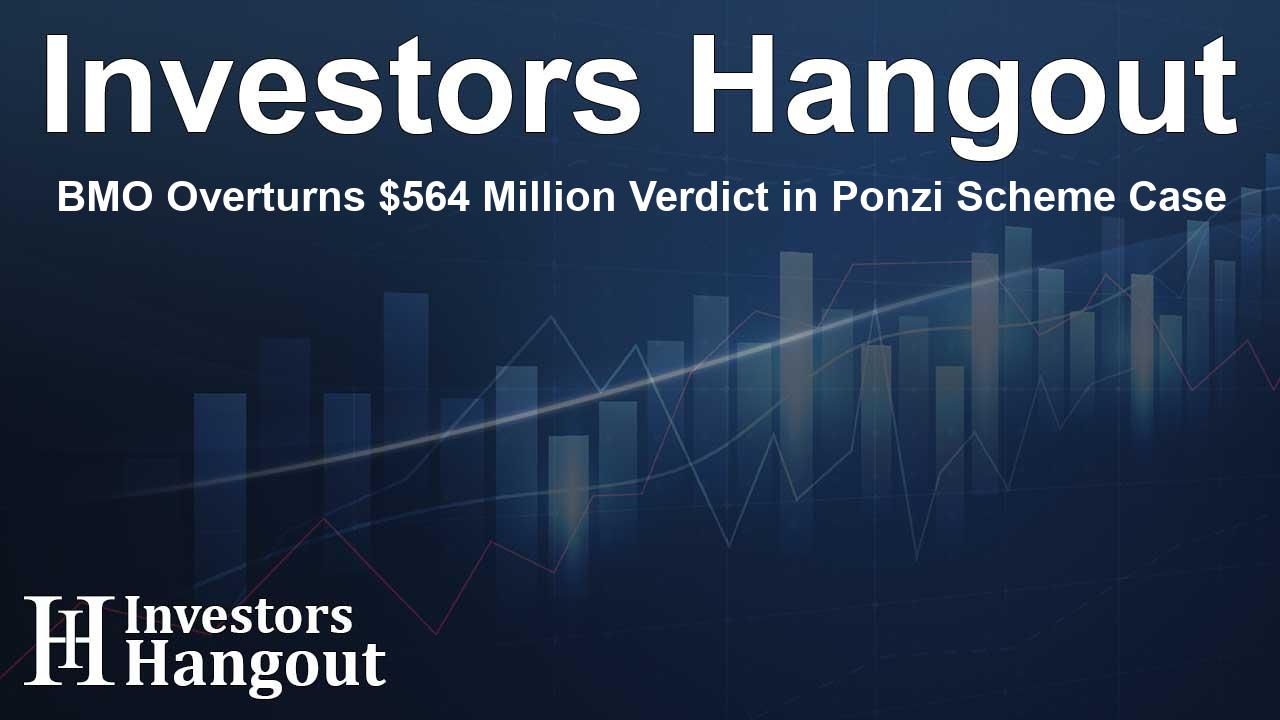BMO Overturns $564 Million Verdict in Ponzi Scheme Case

BMO Triumphs in Legal Battle Over Ponzi Scheme Verdict
Recently, the Bank of Montreal scored a major legal win when a U.S. appeals court agreed to throw out a staggering $564 million jury verdict related to its subsidiary's connection to a well-known Ponzi scheme run by Minnesota businessman Tom Petters.
Understanding the Court's Ruling
The ruling from the 8th U.S. Circuit Court of Appeals drew a parallel to a high-profile case involving Bernard Madoff. The court found that a court-appointed trustee for the bankrupt Petters Co. couldn't pursue claims on behalf of the creditors, asserting that the company itself was responsible for its involvement in the fraud.
Case Background
This unanimous decision came from a panel of three judges who overturned a previous jury verdict from November, thereby dismissing the claims brought by trustee Douglas Kelley against the Bank of Montreal.
Reactions from Both Parties
BMO expressed their pleasure with the ruling, hoping it would allow them to reverse a loss provision of C$1.19 billion, including interest. As a result, this would translate into around C$875 million (approximately US$644 million) in after-tax benefits for BMO's corporate services division in their upcoming financial reports.
Tom Petters and His Crimes
To give some context, Tom Petters is currently serving a lengthy 50-year prison term after being convicted on various charges, including fraud and money laundering. His Ponzi scheme, which spanned several years, utilized complex deceptions that led to substantial financial losses for numerous investors.
Claims Against the Former Bank
The trustee alleged that Petters' former bank, Marshall & Ilsley, was aware of the fraudulent activities but chose to ignore the signs. Kelley contended that the bank enabled Petters to withdraw large amounts of money unlawfully, thereby playing a part in the unfolding disaster.
BMO's Purchase of the Bank
It's worth mentioning that BMO purchased Marshall & Ilsley in 2011, which led Kelley to hold the larger bank responsible for the supposed negligence and wrongdoing.
The Legal Principle Involved
The appeals court emphasized an important legal concept known as "in pari delicto," which means that a party can't seek recovery if they share equal or greater fault than the defendant. Therefore, since the trustee acted on behalf of Petters Co., the court concluded that BMO was shielded from liability.
Broader Impact of the Ruling
This ruling sets a legal precedent that mirrors previous decisions, including a 2013 case that dismissed claims made by the trustee liquidating Madoff's firm against major banks like JPMorgan Chase. Such decisions ignite discussions about the responsibility of financial institutions regarding their clients' illicit actions.
Conclusion and Looking Ahead
BMO's recent legal victory not only relieves a significant financial strain but also sheds light on the complexities of bankruptcy law and what financial institutions must do to oversee their clients' behavior. As we move forward, it will be vital for banks to strengthen their compliance protocols to prevent potential involvement in similar fraudulent schemes.
Frequently Asked Questions
What was the basis of BMO's appeal?
BMO's appeal relied on the legal doctrine of "in pari delicto," claiming the trustee bore equal responsibility for the misconduct.
What are the financial implications for BMO?
This ruling enables BMO to reverse a loss provision of C$1.19 billion, resulting in an estimated net gain of C$875 million in their upcoming quarterly results.
Who was Tom Petters?
Tom Petters is a former businessman serving a 50-year prison sentence for orchestrating a Ponzi scheme that swindled billions from investors.
What prior cases did the court reference?
The court pointed to earlier rulings involving Madoff, noting that similar legal principles were at play in this case, which influenced their conclusion.
How does this ruling affect the accountability of financial institutions?
The ruling highlights the importance of financial institutions being vigilant in monitoring client fraud to minimize their risk of liability.
About The Author
Contact Henry Turner privately here. Or send an email with ATTN: Henry Turner as the subject to contact@investorshangout.com.
About Investors Hangout
Investors Hangout is a leading online stock forum for financial discussion and learning, offering a wide range of free tools and resources. It draws in traders of all levels, who exchange market knowledge, investigate trading tactics, and keep an eye on industry developments in real time. Featuring financial articles, stock message boards, quotes, charts, company profiles, and live news updates. Through cooperative learning and a wealth of informational resources, it helps users from novices creating their first portfolios to experts honing their techniques. Join Investors Hangout today: https://investorshangout.com/
The content of this article is based on factual, publicly available information and does not represent legal, financial, or investment advice. Investors Hangout does not offer financial advice, and the author is not a licensed financial advisor. Consult a qualified advisor before making any financial or investment decisions based on this article. This article should not be considered advice to purchase, sell, or hold any securities or other investments. If any of the material provided here is inaccurate, please contact us for corrections.
